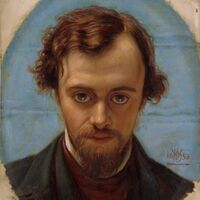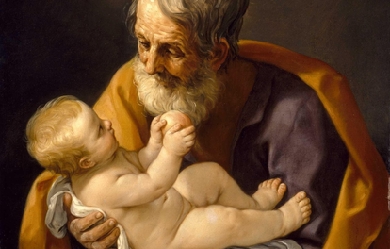Stratton Water
“O HAVE you seen the Stratton flood
That’s great with rain to—day?
It runs beneath your wall, Lord Sands,
Full of the new—mown hay.
“I led your hounds to Hutton bank
To bathe at early morn:
They got their bath by Borrowbrake
Above the standing corn.”
Out from the castle—stair Lord Sands
Looked up the western lea;
The rook was grieving on her nest,
The flood was round her tree.
Over the castle—wall Lord Sands
Looked down the eastern hill:
The stakes swam free among the boats,
The flood was rising still.
“What’s yonder far below that lies
So white against the slope?”
“O it’s a sail o’ your bonny barks
The waters have washed up.”
“But I have never a sail so white,
And the water’s not yet there.”
“O it’s the swans o’ your bonny lake
The rising flood doth scare.”
“The swans they would not hold so still,
So high they would not win.”
“O it’s Joyce my wife has spread her smock
And fears to fetch it in.”
“Nay, knave, it’s neither sail nor swans,
Nor aught that you can say;
For though your wife might leave her smock,
Herself she’d bring away.”
Lord Sands has passed the turret—stair,
The court, and yard, and all;
The kine were in the byre that day,
The nags were in the stall.
Lord Sands has won the weltering slope
Whereon the white shape lay:
The clouds were still above the hill,
And the shape was still as they.
Oh pleasant is the gaze of life
And sad is death’s blind head;
But awful are the living eyes
In the face of one thought dead!
“In God’s name, Janet, is it me
Thy ghost has come to seek?”
“Nay, wait another hour, Lord Sands,—
Be sure my ghost shall speak.”
A moment stood he as a stone,
Then grovelled to his knee.
“O Janet, O my love, my love,
Rise up and come with me!”
“O once before you bade me come,
And it’s here you have brought me!
“O many’s the sweet word, Lord Sands,
You’ve spoken oft to me;
But all that I have from you to—day
Is the rain on my body.
“And many’s the good gift, Lord Sands,
You’ve promised oft to me;
But the gift of yours I keep to—day
Is the babe in my body.
“O it’s not in any earthly bed
That first my babe I’ll see;
For I have brought my body here
That the flood may cover me.”
His face was close against her face,
His hands of hers were fain:
O her wet cheeks were hot with tears,
Her wet hands cold with rain.
“They told me you were dead, Janet,—
How could I guess the lie?”
“They told me you were false, Lord Sands,—
What could I do but die?”
“Now keep you well, my brother Giles,—
Through you I deemed her dead!
As wan as your towers seem to—day,
To—morrow they’ll be red.
“Look down, look down, my false mother,
That bade me not to grieve:
You’ll look up when our marriage fires
Are lit to—morrow eve:
“O more than one and more than two
The sorrow of this shall see:
But it’s to—morrow, love, for them,—
To—day’s for thee and me.”
He’s drawn her face between his hands
And her pale mouth to his:
No bird that was so still that day
Chirps sweeter than his kiss.
The flood was creeping round their feet.
“O Janet, come away!
The hall is warm for the marriage—rite,
The bed for the birthday.”
“Nay, but I hear your mother cry,
‘Go bring this bride to bed!
And would she christen her babe unborn,
So wet she comes to wed?’
“I’ll be your wife to cross your door
And meet your mother’s e’e.
We plighted troth to wed i’ the kirk,
And it’s there you’ll wed with me.”
He’s ta’en her by the short girdle
And by the dripping sleeve:
“Go fetch Sir Jock my mother’s priest,—
You’ll ask of him no leave.
“O it’s one half—hour to reach the kirk
And one for the marriage—rite;
And kirk and castle and castle—lands
Shall be our babe’s to—night.”
“The flood’s in the kirkyard, Lord Sands,
And round the belfry—stair.”
“I bade you fetch the priest,” he said,
“Myself shall bring him there.
“It’s for the lilt of wedding bells
We’ll have the hail to pour,
And for the clink of bridle—reins
The plashing of the oar.”
Beneath them on the nether hill
A boat was floating wide:
Lord Sands swam out and caught the oars
And rowed to the hill—side.
He’s wrapped her in a green mantle
And set her softly in;
Her hair was wet upon her face,
Her face was grey and thin;
And “Oh!” she said, “lie still, my babe,
It’s out you must not win!”
But woe’s my heart for Father John
As hard as he might pray,
There seemed no help but Noah’s ark
Or Jonah’s fish that day.
The first strokes that the oars struck
Were over the broad leas;
The next strokes that the oars struck
They pushed beneath the trees;
The last stroke that the oars struck,
The good boat’s head was met,
And there the gate of the kirk—yard
Stood like a ferry—gate.
He’s set his hand upon the bar
And lightly leaped within:
He’s lifted her to his left shoulder,
Her knees beside his chin.
The graves lay deep beneath the flood
Under the rain alone;
And when the foot—stone made him slip,
He held by the head—stone.
The empty boat thrawed i’ the wind,
Against the postern tied.
“Hold still, you’ve brought my love with me,
You shall take back my bride.”
But woe’s my heart for Father John
And the saints he clamoured to!
There’s never a saint but Christopher
Might hale such buttocks through!
And “Oh!” she said, “on men’s shoulders
I well had thought to wend,
And well to travel with a priest,
But not to have cared or ken’d.
“And oh!” she said, “it’s well this way
That I thought to have fared,—
Not to have lighted at the kirk
But stopped in the kirkyard.
“For it’s oh and oh I prayed to God,
Whose rest I hoped to win,
That when to—night at your board—head
You’d bid the feast begin,
This water past your window—sill
Might bear my body in.”
Now make the white bed warm and soft
And greet the merry morn;
The night the mother should have died,
The young son shall be born.


